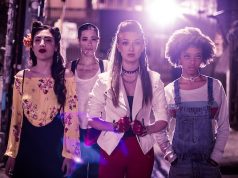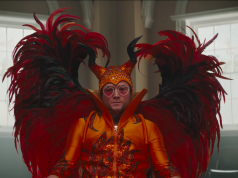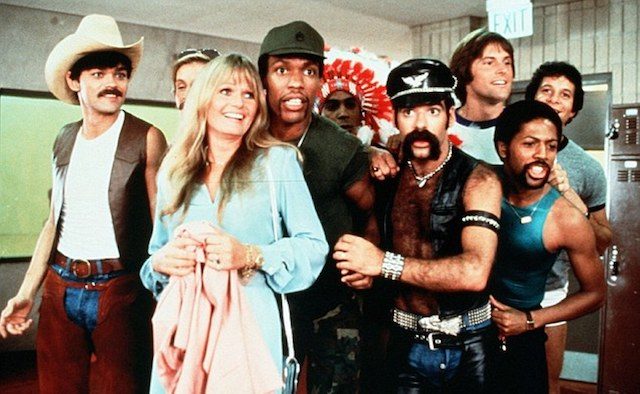
You probably know the Village People as a popular Halloween costume or the punchline to a joke, but there was a time in American history when they were an actual group of recording artists who performed songs that were purchased by millions of people, with money. This occurred in the 1970s, a shameful decade in which the perpetrators of music’s most heinous crimes were seldom punished. At the peak of the Village People’s popularity, it was determined that they should star in a film; that it should present a fictionalized account of how the band was formed; that it should be released while disco was still hot; and that it should be so unbearably painful to watch that it would tear the very fabric of space and time.
The result was “Can’t Stop the Music.” It achieved all of the above-mentioned goals except for the one about being timely. When it was released, in June 1980, disco had not only fallen out of favor but was on the receiving end of a mighty backlash. The movie was a year too late; even if it had been good, no one would have wanted to see it. America’s love affair with disco had proven to be more of a one-night stand, and the country was now stumbling, bleary-eyed and remorseful, out of disco’s apartment building and into the harsh morning light of Blondie and Queen.
What’s immediately notable about “Can’t Stop the Music” is that the Village People, who are not even actors, are not the worst actors in it. That honor is shared by professional actors Steve Guttenberg and Valerie Perrine and professional athlete Bruce Jenner, who for some reason decided to be a movie star just this one time and then never again. Guttenberg delivers every line with the goony over-exuberance of a precocious fifth-grader in a school play; Perrine — who’d been nominated for an Oscar six years earlier for “Lenny” — gives what feels like an infomercial performance at a time when infomercials did not exist; and Jenner reminds me of what happens when professional athletes host “Saturday Night Live,” including flubbing his lines.
[I had a YouTube clip here of one of the scenes where Jenner stumbles over a line, but it’s gone now and I don’t remember what the scene was. Please take my word for it.]
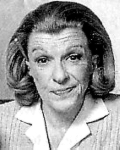
That happens several times in the movie. Note that the movie is not live. It was pre-taped. Which means these presumably “were” the best takes they could get. Also, I feel it is important to mention that the film was directed by actress Nancy Walker, best known for playing Rhoda’s mom on “The Mary Tyler Moore Show” and “Rhoda.” This was the only movie she ever directed. Someone said, “Hey, if we’re going to make a Village People movie, who would be the perfect choice to direct it?” And someone else said, “Probably Rhoda’s mom!” And then that happened.
The plot is as follows. Jack Morell (Steve Guttenberg) quits his job at a record store so that he can be the guest DJ at a discotheque, as somehow this will help him establish his career as a songwriter. (You will recall that Irving Berlin got started the same way.) First, though, he will need to roller-skate all over Manhattan while the opening credits play, as mandated by the Disco & Roller-Skating Act of 1978. According to these credits, the film stars “Village People” — not necessarily the Village People, just some Village People. This is good to know.
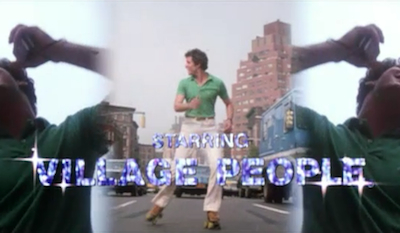
Jack meets up with his platonic friend Samantha Simpson (Valerie Perrine), a former fashion model and current vapid airhead who lives in a spacious house in Greenwich Village and lets Jack stay there because he is indolent. When they get home, they find an Indian in their house. He is Felipe, and he is dressed in full Village People Indian regalia. He is their neighbor, and sometimes he just comes over to watch TV or whatever, like Dennis the Menace does with Mr. Wilson. Why Felipe is always dressed in Daisy Duke shorts, a vest, and an Indian headdress is never explained, or even remarked upon, except by members of the audience, who now see the image when they try to sleep at night.
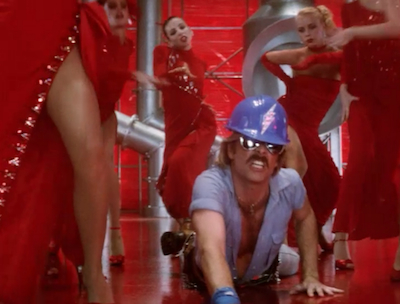
It comes out that Jack wants to make a demo tape of the awesome disco song he wrote, but he needs singers. To that end, Samantha recruits Felipe and a few of her other acquaintances, which include a guy dressed as a cowboy, a guy dressed as a construction worker, and a guy dressed as a police officer because he actually is a police officer. The construction worker, David, is a model who’s in costume for a photo shoot, and he gets his own musical number, a fantasy sequence wherein he sings something called “I Love You to Death” while being erotically (?) harassed by severe-looking women in red evening gowns. History does not record whether the other Village People were jealous of the extra screen time David got. The cowboy’s name is Randy, and there is no word on whether he actually rides a horse and associates with cattle.
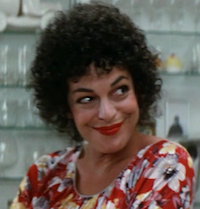
So everyone comes over to Samantha and Jack’s house to record the song. Also present is Samantha’s friend Lulu (Marilyn Sokol), a mannish succubus who fills the role of Female Lead’s Throaty-Voiced Friend Who Stands Around Saying Smutty Things (or, as it’s known to casting directors, the Kim Cattrall). Lulu is the type who always wants to let you know when she finds a man sexually attractive, and who coincidentally also finds all men sexually attractive. She is particularly smitten by Felipe. This is what she tells Samantha:
“The Indian is hot! I go for exotic types, particularly when they’re half-naked! You tell him I’ll make up for all the indignities they suffered in ‘Roots’!”
I find myself at a loss for words here, so I’ll just repeat what she said:
“The Indian is hot! I go for exotic types, particularly when they’re half-naked! You tell him I’ll make up for all the indignities they suffered in ‘Roots’!”
Also joining the party is Ron (Bruce Jenner), an uptight tax attorney who knew Samantha’s sister when he lived in St. Louis and who shows up to deliver a cake on behalf of the sister. Evidently, when this sister learned that Ron was moving to New York, she said, “My sister Samantha lives there! When you arrive, will you please obtain a cake and deliver it to her?” The movie needed to introduce a new man into Samantha’s life, and instead of a “meet cute” chose the less common “meet lazy.” This page of the screenplay probably just read: “Stranger with cake enters, joins movie, becomes love interest.”
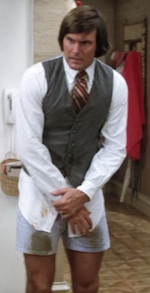
The cowboy, Indian, cop, and construction worker do a terrific job on the demo tape, with harmonies and choreography (note: choreography is not necessary for an audio tape) and everything. Still, there is the sense that the quartet ought to have even more members, in perhaps even more absurd and unexplained get-ups, like maybe a pirate or a hobo or a fairy princess or two guys inside of a horse costume. They will need to hold auditions! In the meantime, Ron and Samantha sleep together, on account of she accidentally spills lasagna on his pants and so he has to take them off, and whaddaya gonna do? (Trivia: This is also how Abraham Lincoln and Mary Todd first consummated their love.)
A lot of freaks come to the audition, including a biker and a military guy. Why you would make “Village People: Origins” and not even bring on the leather daddy and the soldier until the movie’s half over is beyond me, but there you go. Ron arranges for the newly formed sextet to rehearse at the YMCA, primarily to give the movie an excuse to feature the song by that name, “Newly Formed Sextet.” No, I kid, it’s “YMCA,” in which young men who are down on their luck and low on cash are encouraged to have sex in a locker room, or something.
To get the new Village People some exposure, Samantha returns to the world of modeling to do a milk commercial and arranges for them to be in it. For the commercial, they do an elaborate production number called “Milk Shake.” It’s three minutes long and pretty lewd for a milk commercial, and they are astonished when the Milk Council doesn’t want to use it. Samantha’s sleazy record-company friend won’t give them a recording contract, either. But not to worry, Ron’s socialite mother is doing a fundraiser in San Francisco, and somehow the Village People can perform at it, and then they will be famous? I guess? The group performs “Can’t Stop the Music,” which proves to be true.
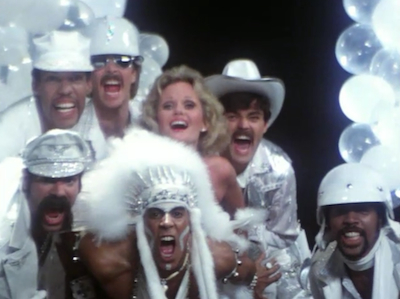
Perhaps you are wondering why we have gone the entire column without mentioning the big gay elephant in the room. Well, it’s because the movie doesn’t mention it either. That’s right: one of the most flamboyantly gay motion pictures ever committed to celluloid, and it contains not a single gay character, nor even the suggestion that “gay” is even a thing that exists. It takes place in an entirely gay world in which no one is actually gay. How do you make a movie about the Village People and omit every reference to homosexuality? That’s like making a movie about the Beatles and never mentioning England.
And so we have bizarre moments like Lulu throwing herself at Felipe and no one telling her, hey, just FYI, you might be barking up the wrong tree. The “YMCA” number is a campy montage of athletic men wrestling and frolicking and having naked towel fights in the shower — but it’s totally straight, bro, because look, there’s Valerie Perrine’s boobs, too! They sing a song called “Liberation” that is clearly about gay rights; ironically, however, they’re singing it in a movie where no one is allowed to use the word “gay” or its synonyms, or make a reference to whom someone is dating or at what type of disco Felipe is a go-go dancer, or indicate why, exactly, they think San Francisco will be a good place for them to perform. It makes me think that the story of putting the movie together, with all the behind-the-scenes negotiations and studio worrying and script de-gayification, must be more interesting than the movie itself (which, admittedly, isn’t saying much). Someone should make a documentary called “Can’t Stop ‘Can’t Stop the Music’: The Straightening of the Village People.” I would totally watch that, as long as it didn’t have any Village People music in it.
— Film.com



